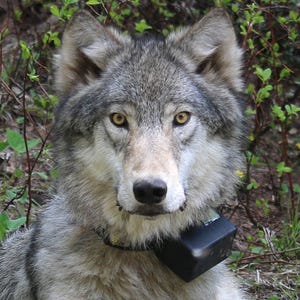Well, sort of.
Before moving to Oregon almost a decade ago, I grew up in Minnesota, one of the few places in the Lower 48 where wolves were never wiped out.
It's a state I've always described as being a lot like Oregon, culturally and politically, but with more people, colder weather and fewer mountains.
Minnesota is home to at least 2,400 wolves, while Oregon has 77. In the places I spent my summers, Voyageurs National Park and the Boundary Waters Canoe Area Wilderness near the Canadian border, there are 30 to 50 wolves at any given time.
I knew about the wolves growing up — one of our favorite fishing spots for walleyes was off Wolf Island. On occasion, while camping on the islands of the lakes, we would hear a howl echo across the water.
The reality of being among wolves never impacted me, our family, our dog or anyone we knew. Not in the slightest.
My cousin used to work at a place called Wolf Ridge, an environmental learning center where wolves roam the forest. Wolves never did snatch any children.
There has been one recorded attack on a person in the last century by a wolf in Minnesota. In Canada, home to over 60,000 wolves, there have been two fatal attacks in the entire country over the last 10 years.
Why does this matter? As I reported, wolves have arrived in Western Oregon after a nearly 60-year absence. They are likely to increase in numbers across the Cascade, Coast and Klamath-Siskiyou ranges in the coming decades.
Wolves are the most polarizing animals in the West (sorry, spotted owl). The debate often turns toxic. And there can be major challenges with wolves, particularly for those keeping livestock or animals in rural areas.
If wolves were attacking my animals during the night, that would be scary, and I would want to take action. It's not an unfounded concern, and there is a reason our ancestors took such pains to wipe them out. Laws such as the Endangered Species Act, while allowing wolves to recover, make the situation complex by making some feel helpless to protect themselves and their property. That's not the only problem, but it's a big one.
All of that said, wolves are unlikely to impact the vast majority of Oregonians other than as an idea. Wolves tend to leave people alone, according to every expert I've interviewed. You can live, camp and play near wolves and never know they are present.
The Internet makes it easier than ever to find examples of terrifying wolf behavior. One example, a woman who was attacked and killed by wolves while jogging in Alaska in 2010, is particularly scary. These are anomalies, however, and the same type of stories can be found about other predators.
I grew up in wolf country, lived among them for 20 summers, and never even saw one. I suspect Oregonians will have the same experience.
Zach Urness' grew up in Minnesota, but has roots in Oregon going way, way back in Hood River, Portland and Salem. He arrived in Oregon in 2007 after a stint in Montana and has been an outdoor writer ever since.
source



No comments:
Post a Comment